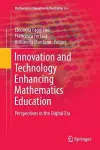
Innovation and Technology Enhancing Mathematics Education
3 contributors - Paperback
£129.99
Eleonora Faggiano is Assistant Professor of Mathematics Education in the Department of Mathematics, at Università di Bari Aldo Moro, Italy. She has a PhD in Computer Science centred on a framework to design, develop and evaluate a Web-based cooperative learning environment and its application to mathematics education. She is involved in several pre-service and in-service mathematics teacher-training programs. Her research focuses on the teaching and learning of mathematics with digital technology and includes the study of dynamic geometry in primary school classrooms. In particular, she investigates aspects of innovative practices that can lead to the construction of mathematical meanings in technology rich environments, from task design to the role of the teacher.
Francesca Ferrara is Associate Professor of Mathematics Education in the Department of Mathematics, at Università di Torino, Italy. Her research focuses on the role and uses of technology in mathematics teaching and learning; how theories of embodiment have informed and changed our ways of doing research in the field; the role of visualization and imagination in mathematics thinking; and mathematical inventiveness. Her recent work also examines how new materialist perspectives offer reflections on mathematical practice, and gamification paradigms applied to mathematics education. She is one of the authors of the Italian translation of the book Lakoff, G. & Nunez, R.E (2000) Where Mathematics Comes From: How The Embodied Mind Brings Mathematics Into being. New York, NY: Basic Books, and editor of the volume Emerging Perspectives on Gesture and Embodiment in Mathematics. Charlotte, NC: Information Age Publishing.
Antonella Montone is Assistant Professor of Mathematics Education in the Department of Mathematics, at Università di Bari Aldo Moro, Italy. She is coordinator of the Mathematics Education research group of the Department and is involved in several pre-service and in-service mathematics teacher-training programs. Her research focuses on two main aspects closely related to each other: the use of technology in mathematics teaching and learning, and the study of innovative practices for the construction of mathematical meanings with digital and manipulative artefacts. In particular, she investigates the role of the teacher as designer of tasks and orchestrator of discussions.